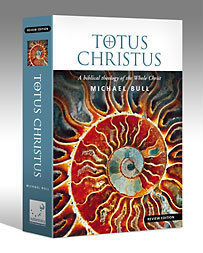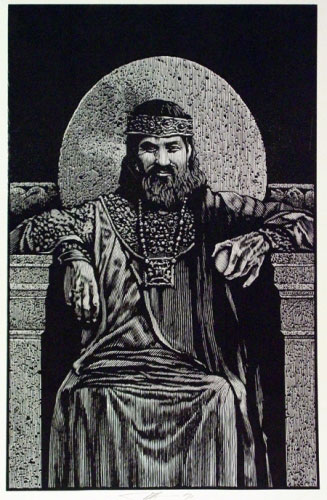May
12
2009

“And in that day His feet will stand on the Mount of Olives, which faces Jerusalem on the east. And the Mount of Olives shall be split in two, from east to west, making a very large valley; Half of the mountain shall move toward the north and half of it toward the south.” Zechariah 14:4
Surprising as His ways are, the Lord always follows procedure. Like Ahasuerus in the book of Esther, anything that is done is done by decree. Although, in the case of Ahasuerus, he needed to consult his elders, whereas God only consults his maturing elders (like Abraham and David–and now the church) to bring us to greater maturity.
A decree is written in the Most Holy, the king’s garden court (head). The elders in the Holy Place respond with liturgy (body). And then they ride out into the world on the swiftest horses to incite a Holy War that divides the world to bring about a New Creation.
Continue reading
Comments Off | tags: AD70, Ahasuerus, David, Esther, Greek philosophy, Liturgy, Numbers 5, Remnant, Restoration, Solomon, Temple, Zechariah | posted in Biblical Theology, The Last Days, The Restoration Era
Apr
18
2009
or A Marriage Made in…
The Bible is big on mediators. Adam’s role as faithful Showbread would link heaven and earth. He would be a god-man. Fulfilled by Christ, this is the liturgical role of a minister. He faces God as representative of the Bride, and faces the church as the representative of the Bridegroom. He is Solomon at the completion of the Temple dedication.
The ‘hell’ hybrids are the Land-beasts of the Bible. This is what Adam became, conspiring with Satan. It was an unholy alliance between God’s mediator and the Creation, in which the Creation called the agenda. The resulting peoples are hunters like Nimrod and Esau, wolves instead of shepherds, bloodthirsty children of the daughters of men.
Continue reading
Comments Off | tags: 666, AD70, Adam, Boaz, Compromise, Crystal Sea, Dominion Theology, Esther, Herod, Intermarriage, Joseph, Nero, Nimrod, Paul, Pilate, Revelation, Solomon, Table of Showbread, Temple, Totus Christus, Wormwood | posted in Biblical Theology, The Last Days
Apr
17
2009
The Third Trumpet
De-Ascension – the Temple judged
The third angel blew his trumpet, and a great star fell from heaven, blazing like a torch,
 After the ascension of Christ, Satan was expelled from his “ministry” before God as the Accuser of man. Like the evil twin of the blazing torch that measured Abram’s sacrifices, he was then used by God to bring an end to the Covenant.
After the ascension of Christ, Satan was expelled from his “ministry” before God as the Accuser of man. Like the evil twin of the blazing torch that measured Abram’s sacrifices, he was then used by God to bring an end to the Covenant.
and it fell on a third of the rivers and on the springs of water. The name of the star is Wormwood. A third of the waters became wormwood, and many people died from the water, because it had been made bitter.
These first three trumpets concerned the Land (Judah), the Sea (the world empire) and the springs of water (the Temple). This same order began the song of ascension, Psalm 24:
Continue reading
Comments Off | tags: Babylon, Compromise, Esau, Herod, James Jordan, Numbers, Restoration, Revelation, Satan, Solomon, Wormwood | posted in Biblical Theology, The Last Days, Totus Christus
Apr
16
2009
“Because of Christ we are thought of as fools, but Christ has made you wise. We are weak and hated, but you are powerful and respected. Even today we go hungry and thirsty and don’t have anything to wear except rags. We are mistreated and don’t have a place to live. We work hard with our own hands, and when people abuse us, we wish them well. When we suffer, we are patient. When someone curses us, we answer with kind words. Until now we are thought of as nothing more than the trash and garbage of this world.” 1 Corinthians 4:10-13
So, are God’s people to wear rags? Or should they be dressed well like Solomon or the woman in Proverbs 31? Or is that even the right question?
Continue reading
Comments Off | tags: Adam, Corinthians, Daniel, Ecclesiology, Ezekiel, Ezra, Joseph, Maturity, Mordecai, Nehemiah, Noah, Paul, Proverbs, Robes, Solomon | posted in Biblical Theology, Totus Christus
Apr
10
2009
In his lectures on worship, James Jordan comments:
The church is the first form of the kingdom. The church is also the nursery of the kingdom. It’s within the institutional church that the fundamental principles of the kingdom are taught and learned. Christians learn government through the church government of elders. Having learned that, Christians are then ready to govern in more broad circumstances. We learn finances in the church, through the administration of the tithe. We learn charity in the church because we are starving and God feeds us bread and wine.
We learn music in the church. All of western music flows out of the music of the church. All of western theatre flows out of the liturgy of the church. All of western literature flows out of the literature of the church.
The church creates civilisation. The church is the nursery of culture.1
Western culture, then, is at the stage of Solomon with his idolatrous wives. The church is now just mimicking the corrupted culture of the world instead of being the pioneer. And we know what happened to Solomon’s kingdom.
1 Ten Principles of Worship, Lecture 1. Available from www.wordmp3.com
Comments Off | tags: Compromise, Culture, Ecclesiology, James Jordan, Music, Solomon, Wisdom | posted in Biblical Theology
Apr
10
2009
Solomon’s New Broom
Solomon continued David’s role as redeemer/blood avenger. Like Ham’s attack on Noah, and Absalom’s sin on the roof, Adonijah’s request for one of David’s concubines was recognised as a grasp for the throne. Joab was judged for his shedding of innocent blood, and although he grasped the horns of the altar, refuge was lawfully denied (Numbers 35:15-19).1
The last priest of the house of Eli, Abiathar, was exiled before the Ark was given a permanent house. Like Gideon’s bull, the guilty “died” on the old altar before a new one could be established.
Solomon’s judicial execution of his father’s enemies was not paranoid. It was “good death.” The Lord always builds His house out of the corpses and plunder of His enemies. As death precedes resurrection, so discipline must come before joy (Hebrews 12:11) and Solomon’s actions here demonstrated his great wisdom as a judge.
______
1 “Why grasp the horns of the altar when you’re a fugitive in the temple? How is it legitimate to touch the horns, when the altar as a whole is forbidden to all but the priests? The answer to the first is found in the premise of the second: The altar is holy, and communicates holiness to anyone who touches it (if they aren’t holy already). When a fugitive grasps the horns of the altar, he becomes sanctified and hence inviolable. If found guilty, he will be killed (like Joab) because of a sacrilege; but if he is innocent, he protects himself with a taboo of holiness.” Peter J. Leithart, Horns of the Altar, www.leithart.com
Comments Off | tags: Absalom, Adonijah, David, Ham, Justice, Noah, Peter Leithart, Solomon, Wisdom | posted in Biblical Theology, Ethics
Apr
10
2009
The Mortification of Sin

Christ’s glory followed His victory in Gethsemane’s “Eden”.
When the Lord gave Adam the Law, He handed him a “scroll”—Adam’s mission. With clean hands and a pure heart, Adam could unseal and “look into it.” When the Lord returned, full of eyes, the scroll was open for blessing or cursing depending on Adam’s obedience. It was not the Lord who judged Adam, but the Lord’s words,unsealed at his “ascension” to headship over Eve, that judged him at the last day (of the week).
“If anyone hears my words and does not keep them, I do not judge him; for I did not come to judge the world but to save the world. The one who rejects me and does not receive my words has a judge; the word that I have spoken will judge him on the last day.” (John 12:47-48)
An open scroll brings testing. Adam’s disobedience opened his two eyes to his nakedness (Genesis 3:7), and the death of Passover (substitutionary animals). It opened his works to seven eyes of judgment—a cup of curses. Jesus’ obedience under testing brought Him glorification, the seven open eyes of the covered High Priest – the slain Lamb. Either we judge, or we are judged.
As Solomon, we put our “enemies” (sins) to judicial death (good death) as we mortify them (Romans 8:13; Colossians 3:5).
See also: Three Resurrections – 3: The Mission
[Solomon illustration from Barry Moser's illustrated King James Bible. Notice the round "firmament" over his head. Solomon sat enthroned between heaven and earth.]
Comments Off | tags: Culture, Justice, Solomon, Wisdom | posted in Biblical Theology
Apr
10
2009
Do the words ‘Love, joy, peace, patience, kindness, self-control’ make you think of old ladies, tea cups, embroidered Bible bookmarks and homemade jam?

Perhaps if we looked to the Old Testament for examples of godliness instead of 19th century pietism we men would do better and so would our churches.
Think of Abraham’s kindness as he plunders the kings of the plain to rescue his nephew! His self-control as he refuses the riches of Egypt and Sodom! Solomon’s national peace after the destruction of his father’s enemies! His throwing of loud, generous and very alcoholic parties to express his joy! Because of their great love, Paul risking his life to stand and preach publicly, and Jesus using cutting words to tell off the Jews for their neglect of mercy and justice. And of course, the very masculine patience of Job in the face of continuous accusations.
These might seem a bit offbeat, but it would sure help us to think more this way. If these don’t sound very Christian you should read your Bible instead of your embroidered bookmark. Otherwise, go ahead and join the Women’s Guild.
I guess it boils down to active versus passive godliness.
Comments Off | tags: Abraham, Job, Masculinity, Paul, Solomon | posted in Christian Life
Apr
10
2009
On the AV forum, Matthew Cart wrote:
When I was first a Christian I used to believe that it was always wrong to tell a lie, no matter what. Both Leviticus 19:11 and Colossians 3:9 talk about not lying to one another. There are scores of verses that talk about honesty.
I was first introduced to the idea of exceptions to this rule by a friend of mine. He spoke about the Chinese Christians who lie to communist authorities while they are escaping from prison and persecution type situations. Also there are Bible smugglers who lie to get Bibles to Christians in persecuted countries. There is a lot of deceit that happens, even with Voice of the Martyrs, doing things in secret and using deception for the sake of the gospel. You could consider this lying.
Didn’t Christians also practice deception and lying during Hitler’s reign to have the Jews? Someone would come to their house and ask if there were Jews there and they would say, “No”.
I am also challenged by the story in 1 Kings 22 where God put a lying spirit in the mouth of his own prophets in order to purposely deceive someone…
The repeated theme is (I think) actually that of the “warrior-bride” tricking the “serpent” before making an escape, as observed by James Jordan in his lectures. This would possibly include all the examples above plus the Hebrew midwives, Rahab’s hiding of the spies, Jael’s deception of Sisera, Michal’s lie after David’s escape and Esther’s “invitation” to Haman. These and many more were “eye for eye” justice from Eve upon the father of lies, the serpent, fulfilled of course in the cross.
It appears again in Revelation, when the serpent vomits out counterfeit living waters (false doctrine) which is swallowed hook, line and sinker by the Judaisers and Jews (the “Land”), but not the saints. In this case it was like Solomon’s sword – a deception that made plain which woman was the true mother of the living child and which woman was lying.
So Eve deceives the serpent. It is ironic justice.
Comments Off | tags: James Jordan, Rahab, Revelation, Satan, Sisera, Solomon, Wisdom | posted in Biblical Theology, Ethics
Apr
10
2009
A Conspiracy of Nations
Amalek is the archenemy of the saints. This first Amalek most likely descended from Japheth. Numbers 24:20 paints him as the original great “Sea beast”, and a counterfeit Alpha and Omega.
“Amalek was the first of the nations, but his end shall be destruction.”
Esau moved to Mount Seir and merged with the Horites to become ahybrid part-Canaanite people known as Edomites. One of Esau’s grandsons was named Amalek (Genesis 36:16), which shows a conscious or subconscious alliance between Gentile hatred and false brother hatred of God’s chosen son—a “Land beast”. This has an enormous impact on interpreting the later history of the Bible.1
Continue reading
Comments Off | tags: Amalek, Bible history, Deborah, Edomites, Esau, Jabin, Jericho, Judges, Resurrection, Sisera, Solomon, Typology | posted in Against Hyperpreterism, Biblical Theology, The Last Days





























